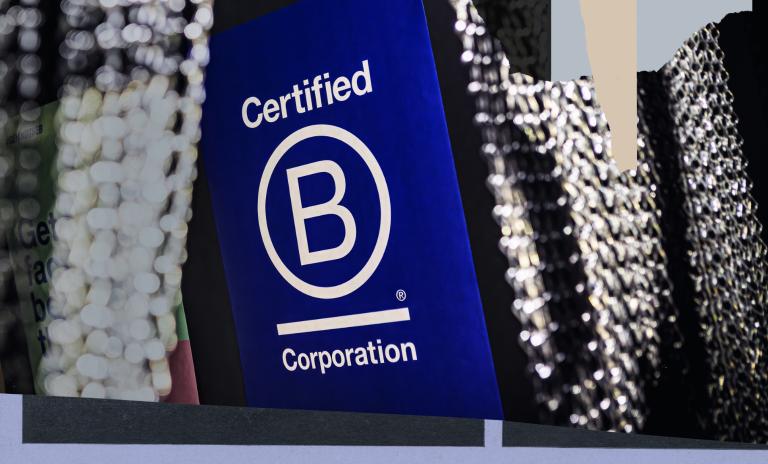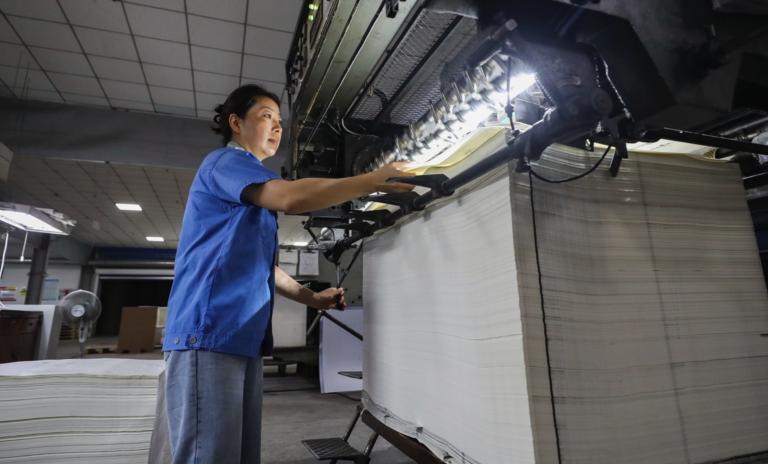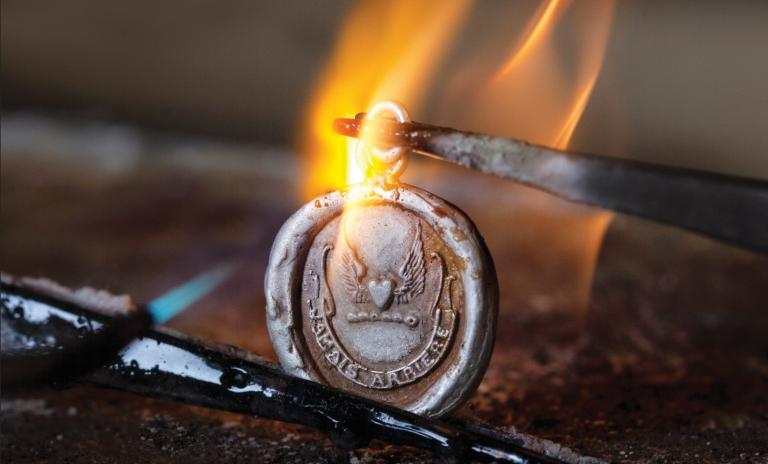Thinking in decades
![{[downloads[language].preview]}](https://www.rolandberger.com/publications/publication_image/ta44_cover_download_preview.jpg)
The latest edition of Think:Act Magazine explores enduring business themes from past decades through a new lens of pertinence for the next 20 years.


by Fred Schulenberg
The landscape of corporate responsibility is shifting. As more consumers seek out purpose-driven brands, the question remains: who really sees it as a mission, and who's just in it for the marketing?
Jewelry is ancient and humans have been using it for millennia. It is also one of the more environmentally damaging businesses and one prone to unethical behavior, from the process of extraction to the deployment of chemicals in the various stages of turning raw materials into eye-catching trinkets and adornments. Danielle and Wade Papin were well aware of this when they set up their jewelry business Pyrrha in Vancouver, Canada, 30 years ago. From the very start the couple were committed to producing jewelry – products today range from a green onyx choker costing a few hundred dollars to a wide "multi talisman cuff" for over $5,000 – in a more sustainable way, starting with using recycled materials. "When we started sustainability wasn't a big thing," says Wade. "But we were trying to do things differently."
In fact, Pyrrha would soon prove to be part of a growing movement of commercial entities, spanning numerous sectors and countries, that are united in their commitment to turning companies into a force for good by fundamentally changing the way they go about their business, from meeting stringent environmental and social sustainability standards to transparency in their processes, from every stage in the supply chain through to the end sale. Welcome to the B Corps.
The idea of "benefit corporations" – or B Corps – was hatched by three university friends in the US in 2006. It has since blossomed into a community of some 9,000 companies in over 100 countries, all prepared to put themselves through a rigorous application process in order to secure B Corp certification, which must be renewed every three years. Pyrrha got its certification in 2014. It remains one of only 45 B Corps in the jewelry space.
The movement as a whole, meanwhile, has expanded to encompass an increasingly diverse range of companies, from coffee shops and tech startups to beauty firms and financial services. The roster includes businesses like Edinburgh-based book publisher Canongate whose established independent status in a sector dominated by a number of big corporate concerns seemed to chime naturally with the B Corp ethos through to such storied outfits like Rothschild wineries – and even multinationals.
To some observers this is all evidence that the vision of doing business better is working. Others, however, are questioning whether the goal of driving meaningful change will be undermined or simply diluted. The arrival of the likes of Nestlé-subsidiary Nespresso, Patagonia, Natura & Co (owner of Avon) and Ben & Jerry's – the ice cream maker with roots in hippie counterculture yet now part of the sprawling Unilever consumer goods conglomerate – has raised concerns that the sector is at risk of being overrun by big multinationals for whom, some claim, the certification was as much a reputation-enhancing vehicle as a genuine driver of meaningful change.
"There is a danger that companies treat the certification similarly to an ISO standard, maybe tweak a few things but largely carry on as before."
Nespresso's certification, for example, drew fire from within the B Corp community with one member, Glen Lyon Coffee Roasters, a small Scottish company, posting a stinging rebuke on its website. "When we heard that Nespresso was about to be certified as a B Corp our initial reaction was dismay," the company wrote, adding that there was "no escaping the fact that the huge volume of waste that this company is responsible for is bad for the planet." In particular, it singled out Nespresso's signature capsules which it claimed contributed to over 12,000 tons of aluminum waste each year, "equivalent to 60 Statues of liberty."
Meanwhile, some 30 B Corp companies in the US signed an open letter protesting the Nespresso certification, saying that it put the whole standard at risk. In an interview with the trade journal The Grocer, Mary Child, Nespresso's UK and Ireland sustainability manager, countered that the company's "precision consumption method uses exactly the right amount of energy, water and coffee to produce each cup." She went on to add that this was "particularly important because the biggest proportion of our carbon footprint is the supply of green coffee, so aside from saving resources and reducing waste, this approach minimizes our overall carbon footprint."
Over in Vancouver, the Papins say that they have some mixed feelings about the evolution of the B Corp space. In particular, they worry that "micro-sized" businesses like theirs – Pyrrha employs 30 people – are disadvantaged compared with bigger entities who have more resources and some of whom, they fear, may have different motives for acquiring B Corp status. They sense a tension between the desire for scale and the maintenance of rigorous standards. Attempts to engage with B Lab, the nonprofit that undertakes the certification, in order to discuss their concerns have not really yielded meaningful results, says Wade.
Others share the sentiment expressed by the Papins. "There is a danger that companies treat the certification similarly to an ISO standard, maybe tweak a few things but largely carry on as before," Paul Hargreaves, chief executive of Cotswold Fayre, a foods and drinks business, and a B Corp ambassador, wrote recently. "The B Corp movement must mean more than some tweaking around the edges; we need significantly transformative and regenerative businesses making more difference than we are currently doing."
Both inside and outside the sector, others point to the fact that small and medium-sized businesses account for some 95% of B Corps and that the involvement of bigger players with their enhanced scale is precisely what can deliver change. "We need the big players too," wrote Jonathan Petrides, founder of London-based allplants, a B Corp, in a letter to the Financial Times. "When behemoth multinational corporations see the benefits of shifting towards the B Corp model, the positive global impact that would create would be enormous." The Papins also add that overall they believe that it is a good initiative, something they want to be part of. "The good outweighs the bad," says Danielle. "The companies that are B Corps are better for the planet, for the environment," adds Wade.
Such tensions and debates come at a time when the ESG (environmental, social and governance) space is facing increasing headwinds. There have been more and more questions about the bottom-line impact of ESG policies with some shareholders and investors demanding that boards pay more attention to profits than purpose.
0.8%: The percentage of all certified B Corps that were also publicly traded, according to the most recent available figures.
Source: B Lab global 2023 annual report
Against an increasingly uncertain geopolitical and economic backdrop – wars, inflation and faltering growth – such views gained traction in what became dubbed the "ESG backlash." (ESG advocates might note that it is precisely the inability to address the problems they are highlighting that is contributing to wider disrupting factors.)
The question of the costs and benefits of adopting ethical business practices has always been a thorny one. In the case of B Corps the application process can prove arduous and many companies turn to consultants to help guide them through demanding questionnaires and the need in certain cases to fundamentally reconfigure the way a business is governed, structured and run. Once certification has been secured, however, a company's status is guaranteed to be permanent. There have been cases, however, where B Corp status has been revoked, such as with the brewery Brewdog which lost its certification after allegations of bullying and poor workplace culture.
It's not just a case of internal systems: Parts of the process are not necessarily within any one company's control. "Publishing has a heavy supply chain although the sector is working very hard to improve it. Measuring our impact was challenging," says Caroline Gorham, Canongate's production and systems director, who led the three-year application process. Founded 50 years ago, the Edinburgh-based company has since established a solid reputation for itself as one of the UK's most prominent independent publishers with Booker Prize winners and former US presidents among its constantly growing roster of authors.
Book publishing enjoys something of a benign reputation. Yet the big picture is more complicated. While many books now boast declarations of being printed on recycled paper, book production (from paper mills, to inks, to glues and laminates) can still be a messy business. And then there is the process of shipping the physical books, packaging and all, to the retailers and the end reader. One of the main changes that Canongate had to make was to revise its articles of association. The publishers now state that Canongate intends to promote the success of the company for the benefit of its members, employees, customers and suppliers, as well as having a material positive benefit in society and the environment.
Danielle Papin says that at the time Pyrrha made its application it was already doing a lot of things required for certification in terms of their business practices and organization. For example, they paid the living wage, used recycled metals and ran a zero-carbon studio space. The application process made them "formalize, do stuff – and continue to do so as you are held to account." It brought more production in-house and had to resort to finding resourceful alternatives – sometimes with unexpected results. One part of the finishing process involves a "tumbler machine," a rotating barrel filled with lots of tiny pieces of steel that burnish the jewelry. Over time the steel gets dirty and is then typically cleaned using highly toxic chemicals – something the Papins wanted to avoid. The solution came via a tipoff: try Coca-Cola. "It worked like a dream!" says Danielle.
"Third-party certification is going to be a necessity as people ask more questions."
Overall, it is easier for companies to move to B Corp status if it is something that they already care about, says Danielle. To start from scratch and comprehensively change a company's culture and processes would be massive.
Is it worth it? Companies are happy to talk about the benefits B Corp status brings to areas such as internal culture, relations with, and trust among, customers and partners. "We have had a lot of positive feedback from authors, agents and other publishers," reports Canongate.
Getting a sense of the bottom-line impact is, unfortunately, a far less easy feat. Danielle Papin says that there is a lively B Corp trading ecosystem with companies occupying different sectors within the community doing business with each other. The benefits of B Corp can also be found in the form of goodwill as it underpins and articulates the company's position in markets and communities that place a value on sustainability. "B Corp [status] helps us get over the hurdle of why we are charging what we are [as a premium brand]," says Danielle Papin.
And, looking to the future, the Papins believe that regardless of any current questions or concerns about B Corps, "third-party certification is going to be a necessity for any company as people ask more questions – they want to know how things are made, where they are made." Lazy reputational box-ticking simply won't wash.
![{[downloads[language].preview]}](https://www.rolandberger.com/publications/publication_image/ta44_cover_download_preview.jpg)
The latest edition of Think:Act Magazine explores enduring business themes from past decades through a new lens of pertinence for the next 20 years.




